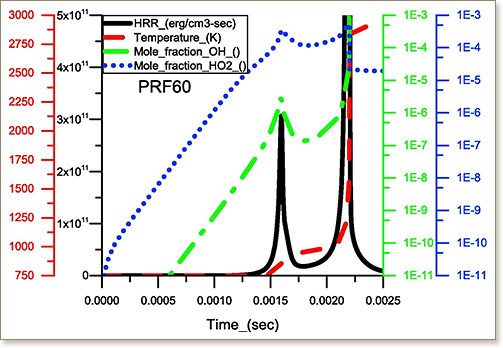2-Methylfuran: A bio-derived octane booster for spark-ignition engines


The efficiency of spark-ignition engines is limited by the phenomenon of knock, which is caused by auto-ignition of the fuel-air mixture ahead of the spark-initiated flame front. The resistance of a fuel to knock is quantified by its octane index; therefore, increasing the octane index of a spark-ignition engine fuel increases the efficiency of the respective engine. However, raising the octane index of gasoline increases the refining costs, as well as the energy consumption during production. The use of alternative fuels with synergistic blending effects presents an attractive option for improving octane index. In this work, the octane enhancing potential of 2-methylfuran (2-MF), a next-generation biofuel, has been examined and compared to other high-octane components (i.e., ethanol and toluene). A primary reference fuel with an octane index of 60 (PRF60) was chosen as the base fuel since it closely represents refinery naphtha streams, which are used as gasoline blend stocks. Initial screening of the fuels was done in an ignition quality tester (IQT). The PRF60/2-MF (80/20 v/v%) blend exhibited longer ignition delay times compared to PRF60/ethanol (80/20 v/v%) blend and PRF60/toluene (80/20 v/v%) blend, even though pure 2-MF is more reactive than both ethanol and toluene. The mixtures were also tested in a cooperative fuels research (CFR) engine under research octane number and motor octane number like conditions. The PRF60/2-MF blend again possesses a higher octane index than other blending components. A detailed chemical kineticanalysis was performed to understand the synergetic blending effect of 2-MF, using a well-validated PRF/2-MF kinetic model. Kinetic analysis revealed superior suppression of low-temperature chemistry with the addition of 2-MF. The results from simulations were further confirmed by homogeneous charge compression ignition engine experiments, which established its superior low-temperature heat release (LTHR) suppression compared to ethanol, resulting in better blending octane numbers. This work explores and provides a chemically sound explanation for the potential of 2-MF as an octane enhancer.
DOI: 10.1016/j.fuel.2018.03.169

"KAUST shall be a beacon for peace, hope and reconciliation, and shall serve the people of the Kingdom and the world."
King Abdullah bin Abdulaziz Al Saud, 1924 – 2015
Thuwal 23955-6900, Kingdom of Saudi Arabia
© King Abdullah University of Science and Technology. All rights reserved